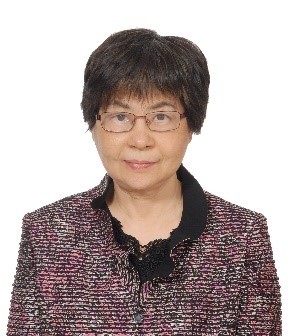
一、基本信息
贾晋华教授
电邮:jennifer2new@yahoo.com
二、学术头衔
武汉大学中国传统文化研究中心驻院研究员
澳门大学哲学及宗教学系兼职教授
Member, Institute for Advanced Study(Princeton)
Fellow, National Humanities Center (USA)
Research Associate, Divinity School, Harvard University
Editorial Board Member,Journal of Daoist Studies
Advisory Committee Member,Journal of Chan Buddhism
《汉语佛学评论》编辑委员会成员
三、教育背景
厦门大学文学硕士
美国科罗拉多大学哲学博士
四、工作经历
07/2021—,武汉大学中国传统文化研究中心驻院研究员
03/2020—,澳门大学哲学及宗教学系兼职教授
08/2017-06/2020,香港理工大学中国文化系教授
08/2008-07/2017,澳门大学中文系/哲学及宗教学系副教授、教授
01/2001-08/2008,香港城市大学中文、翻译及语言学系助理教授、副教授
08/1994-12/1999,美国科罗拉多大学兼职博士生讲师
09/1982-07/1994,厦门大学中文系助教、讲师、副教授
五、研究领域
中国古代文化研究(涉及文学、宗教、哲学等)
中国古代女性及性别研究
古代文献研究
六、科研活动
专著
1.《唐代女道士的生命之旅》。社会科学文献出版社,2022。
2.Gender, Power, and Talent: Daoist Priestesses in Tang China. Columbia University Press, 2018.
3.The Hongzhou School of Chan Buddhism in Eighth- through Tenth-Century China. State University of New York Press, 2006.
4.《古典禅研究:中唐より五代に至る禅宗の発展についての新研究》(修订版)。村田瀿译,斋藤智宽监译。汲古书院,2017.
5.《从礼乐文明到古典儒学》。香江哲学丛书。东方出版中心,2020。
6.《古典禅研究》。牛津大学出版社,2010;当代哲学丛书,上海人民出版社,2013。
7.《唐代集会总集与诗人群研究》。博雅文学论丛,北京大学出版社,2001/2015。
8.《唐五代文学编年史:五代卷》。辽海出版社,1998/2013(获中国图书奖)。
9.《皎然年谱》。厦门大学出版社,1992(获福建省优秀著作二等奖)。
编著
10.Li Zehou and Confucian Philosophy. University of Hawaii Press, 2018 (co-editor)
11.Gendering Chinese Religion: Subject, Identity, and Body.State University of New York Press, 2014 (co-editor)
12.《中国宗教研究新视野》。宗教文化出版社,2020。合编。
13.《社会责任与个体价值:儒学伦理学的现代启示》。齐鲁书社,2019。合编。
14.《新语文学与早期中国研究》。上海人民出版社,2018。合编。
15.《李泽厚与儒家哲学》。上海人民出版社,2017。合编。
16.《融合之迹:佛教与中国传统》。上海人民出版社,2017。
17.《香港所藏古籍书目》。上海古籍出版社,2003。主编(获华东地区古籍二等奖)。
译著
18.《康达维译注文选赋卷》3册。上海古籍出版社,2020(合译)。
19.《晚唐:九世纪中叶的中国诗歌》。三联书店,2011(合译)。
20.《盛唐诗》。三联书店,2004。
21.《初唐诗》。三联书店,2004。
论文(节选)
22.“From Ritual Culture to the Classical ConfucianConception ofyì.”Dao: A Journal of Comparative Philosophy20.4 (2021).
23.“Formation of the Traditional Chinese State Ritual System of Sacrifice to Mountain and Water Spirits.”Religions,2021-04-30, Vol.12 (5), 319: 1–12.
24.“Writings, Emotions, and Oblations: The Religious-Ritual Origin of the Classical Confucian Conception of Cheng (Sincerity).”Religions2021-05-26, Vol.12 (6), 382: 1–15.
25.“The Classical Confucian Conception of Heaven's Mandate.”Philosophy Compass. 16.5 (2021): 1–12.
26.“Li Zehou’s Reconception of the Classical Confucian Concepts of Autonomy and Individuality.”Asian Studies8.1 (2020): 59-75.
27.“Constancy and Ultimate: The Space-Time Continuum in Warring States Cosmology.”Journal of Daoist Studies14 (2021): 1-20.
28.“Redefining Enlightenment Experience: A Philosophical Interpretation of the Dunhuang-VersionPlatform Sūtra.” In Youru Wang andSandra A.Wawrytko, eds.,Dao Companion to Chinese Buddhist Philosophy. Springer, 2019; pp. 351-67.
29.“New Poetry from the Turquoise Pond: Women Poets in Eighth and Ninth Century China.”T’ang Studies37.1 (2019): 59-80.
30.“Religious and Other Experiences of Daoist Priestesses in Tang China.”T’oung Pao:International Journal of Chinese Studies102-4-5 (2016): 321-57.
31.“Li Zehou’s Reconception of Confucian Ethics of Emotion.”Philosophy East and West66.3 (July 2016): 757-86.
32.“Unsold Peony: Life and Poetry of the Daoist Priestess-Poet Yu Xuanji in Tang China (618 – 907).”Tulsa Studies in Women’s Literature35.1 (spring 2016): 25-57.
33.“From Human-Spirit Resonance to Correlative Modes: The Shaping of Chinese Correlative Thinking.”Philosophy East and West66.2 (April 2016): 449-74.
34.“Redefining the Ideal Character: A Comparative Study between the Concept of Detachment in theAṣṭasāhasrikāand Guo Xiang’s Theory of Eremitism at Court.”Dao: A Journal of Comparative Philosophy14.4 (2015): 1-21.
35.“Longevity TechniqueandMedical Theory: The Legacy of Tang Daoist Priestess-Physician Hu Yin.”Monumenta Serica: Journal of Oriental Studies63.1 (2015): 1-31.
36.“Yaochi jiand Three Daoist Priestess-Poets in Tang China.”Nan Nü: Men, Women and Gender in Early and Imperial China2011.2: 13.2 (2011): 205-43.
37.“Religious Origin of Dao and De and Their Signification in theLaozi.”Journal of the Royal Asiatic Society, series 3, 19.4 (2009): 459-88.
38.“From Clan Manners to Ethical Obligationand Righteousness: A New Interpretation of the Termyi.”Journal of the Royal Asiatic Society17.1 (2007): 1-10.
39.“Creation and Codification of Monastic Regulations at Mount Baizhang.”Journal of Chinese Religions33 (2005): 39-59.
40.“Modern Interpretations ofLiushi: The ‘Hermeneutic Circle’ and Its Dissolution.”Monumenta Serica: Journal of Oriental Studies52 (2004): 363-80.
41.“An Interpretation of the Term Fu in Early Chinese Texts: From PoeticForm to Poetic Technique and Literary Genre.”Chinese Literature: Essays, Articles, Reviews26 (2004): 55-76.
42.“Doctrinal Reformation of the Hongzhou School of Chan Buddhism.”Journal of International Association of Buddhist Studies2001.2: 7-26.
43.“An Interpretation of ‘Shikeyi qun’.”T’oung Pao: International Journal of Chinese Studies87 (2001): 1-13.
44.“A Study of theJinglong wenguan ji.”Monumenta Serica:Journal of Oriental Studies47 (1999): 209-36.
45."The 'Pearl Scholars' and the Final Establishment of Regulated Verse."T'ang Studies14 (1996): 1-20.
46.“Li Zehou’s Reconception of Confucian Ethics of Emotion.” InLi Zehou and Confucian Philosophy, ed. Ames and Jia, pp. 155-86.
47.“Study on Two Daoist Treatise of ‘Sitting in Oblivion’.”Journal of Chinese Religions4 (2016): 265-80.
48.“The Identity of Daoist Priestesses in Tang China.” InGendering Chinese Religion(SUNY, 2014),103-32.
49.“Creation and Codification of Monastic Regulations at Mount Baizhang.”Journal of Chinese Religion33 (2005): 39-59.
50.“Mazu Daoyi: A Complete Biography.”Taiwan Journal of Religious Studies1.2 (2001): 119-50.
51.《古典禅研究序论》。村田瀿译,斋藤智宽监译。《禅文化研究所纪要》33 (2016): 207-48。
52.《临济义玄生平事迹考辨》。谈仁译。《禅文化研究所纪要》34 (2017): 133-49。
53.《义务和权利:从礼制到古典儒学的义利观》,《孔子研究》2019年第6期(合著)。
54.《瑶池新咏集:8至9世纪中国女诗人研究》,《江海学刊》2020年第1期。
55.《小品般若经远离说与郭象朝隐论》,《宗教学研究》2017.1: 130-39.
56.《神明释义》。《深圳大学学报》31.3 (2014): 5-15。
57.《道和德之宗教起源》。《中国文化研究》2012.2: 72-91。
58.《宝林传著者及编撰目的》。《文献》2 (2011): 10-18。
59.《走进世界的李泽厚》。《读书》11 (2010): 121-25。
60.《传世洪州禅文献考辨》。《文史》91 (2010.2): 147-82。
61.《兴及兴诗探源》。《中华文史论丛》82 (2006): 181-99。
62.《洪州系的分化与石头系的兴起:解构禅宗传统两系五宗世系图》。《中华文史论丛》78(2004): 54-97。
63.《传世寒山诗集中禅诗作者考辨》。《中国文哲研究集刊》22 (2003): 293-338。
64.《太宗朝宫廷诗人群:唐诗之发轫》。《清华学报》29.1 (1999): 1-30。
65.《汉上题襟集与襄阳诗人群研究》。《文学遗产》2001.5: 31-41。
66.《平常心是道与中隐》。《汉学研究》16.2 (1998):317-349。
67.《五代泉州诗坛》。《厦门大学学报》115(1993.3):63-67。
68.《论韩孟集团》。《中华文史论丛》51(1993):61-74。
69.《皎然非谢灵运裔孙考辨》。《江海学刊》1992.2。
70.《隋唐五代类书与诗歌》。《厦门大学学报》107(1991.3):127-32。
71.《试论王维对禅宗的反影响》。《文学遗产》1991.4:46-50。
72.《大历年浙东联唱集考述》。《文学遗产增刊》18(1989):99-107。
73.《诗可以群:中国传统诗歌普及化轨迹描述》。《江海学刊》142(1989.4):149-55。
74.《皎然论大历江南诗人辨析》。《文学评论丛刊》22 (1984): 136-58。
75.《虚构的世界:论乐府诗的一个重要特性》。《辽宁大学学报》5 (1988): 75-78。
76.《皎然出家时间及佛门宗系考述》。《厦门大学学报》1990.1。